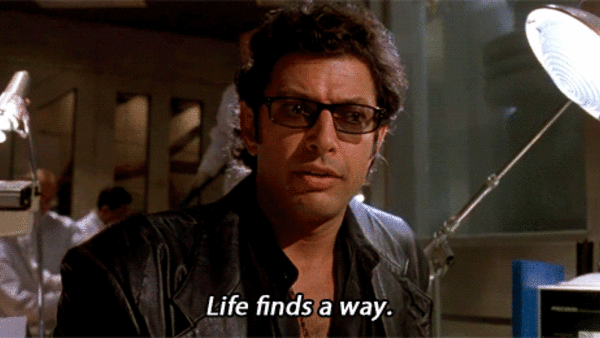10 Controversial Theories About The Universe's Toughest Questions
9. Abiogenesis: Life Finds A Way

Many of the arguments against evolution are that it cannot explain life from lifelessness. Nor does it claim to. Evolution is, strictly speaking, the process that takes place after life has begun. It is the process through which genes are copied imperfectly and mutations occur, it does not explain how the first cells developed or indeed how the cell exists at all.
It's not a stretch to call a cell a molecular factory and an incredibly complex one at that. Molecules are exchanged, changed, encoded with information, read, processed and expelled with a precision and apparent beauty that makes it seem almost impossible not to have come by design. This is the theory of irreducible complexity, i.e. you get to a point where something cannot be made of anything smaller or less complex and retain a useful function. This argument used to be deployed in the explanation of how the human eye could not possibly have evolved by chance but many varying complexities of eyes are found in the animal kingdom. However even today they show this not to be the case.
There are two types of cells, eukaryotes, which have a cell nucleus, and prokaryotes, which don't. The former are either single celled or form part of multicellular creatures, while the latter are usually single celled organisms such as bacteria. That two different types of cell exist show that life was able to find two different solutions, not just one. Granted, one appears more powerful than the other, and we think of ourselves, the multi-celled wonders that we are, to be the pinnacle of evolution. Yet a visitor to the Earth from another world may be forgiven for thinking the bacteria are the true masters of the planet.
But how did these cells come to be in first place? They seemed to appear around half a billion years or so after the Earths formation which would suggest that far from being by chance or design, there is perhaps something inevitable about their formation. In order to get to biology we must first have chemistry and physics.
It's amazing the difference just combining differemnt elements together makes to the final product. Take water, for example: Two of the most volatile and flammable gasses known, hydrogen and oxygen, when combined, make a liquid that puts fire out. So it is with amino acid chains. Some react with others in a specific way and the same ingredients, put together in different ways yields different results. And just as some chemicals don't react with each other so some proteins don't either. It is this mechanism that gives rise to complex and meaningful acid chains that encode for proteins and eventually cells. Given enough time - and boy was there enough time - you're bound to hit on the combination that works eventually.
So far from "spontaneous life" being some miracle event, it is in fact encoded into the very physics and chemistry of the universe. Now that is controversial.